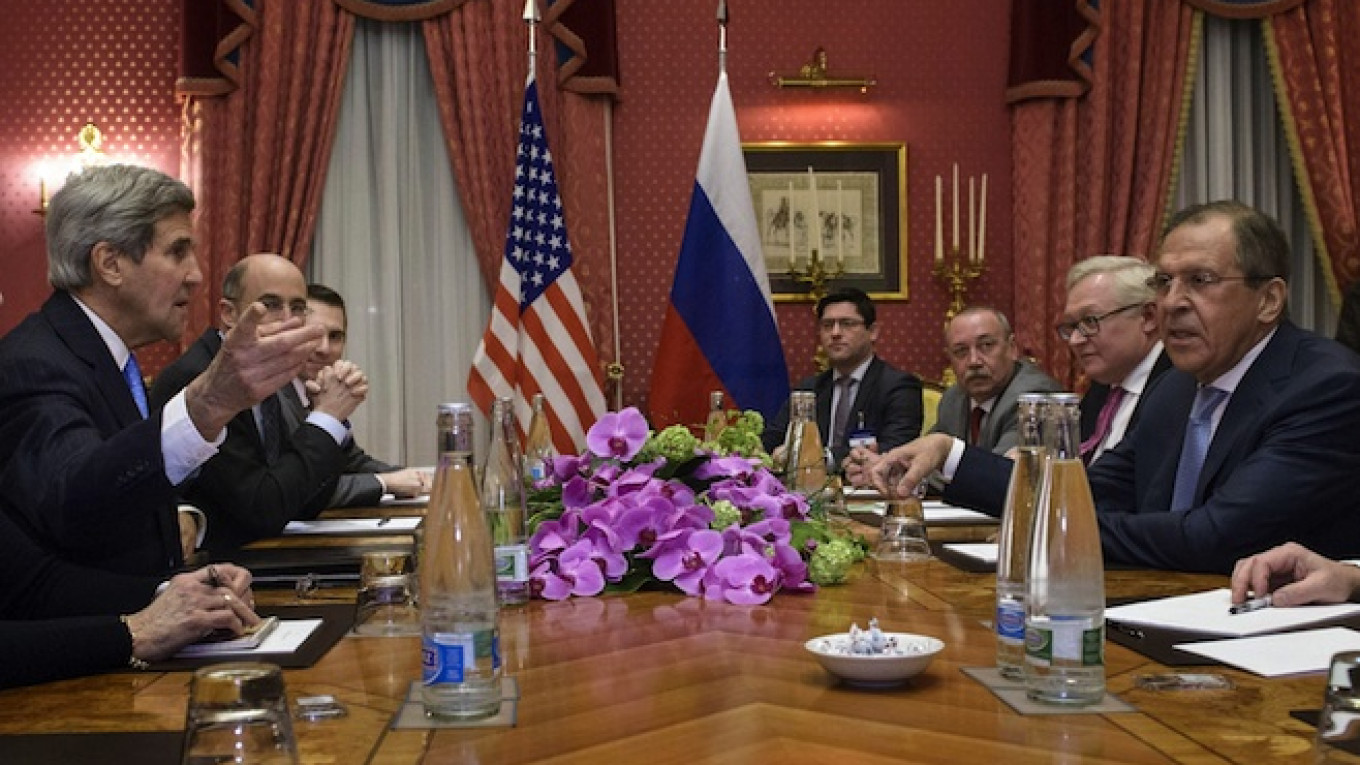LAUSANNE, Switzerland — Iran and six world powers, including Russia, have ramped up the pace of negotiations ahead of a deadline for a preliminary nuclear deal that is less than 24 hours away, as both sides warned it was crucial to overcome differences that could wreck an agreement.
For nearly a week the United States, Britain, France, Germany, Russia and China have been trying to break an impasse in negotiations aimed at stopping Iran from having the capacity to develop a nuclear bomb, in exchange for an easing of international sanctions that are crippling its economy.
But disagreements on enrichment research and the pace of lifting sanctions threatened to scupper a deal that could end a 12-year standoff between Iran and the West over Tehran's nuclear ambitions and reduce the risk of another Middle East war.
"We need to get this done now," a Western official said Tuesday on condition of anonymity. "We only have a few hours left to get a framework agreement or the job is going to become much, much more difficult."
Officials in the Swiss city of Lausanne said talks on a framework accord, which is intended as a prelude to a comprehensive agreement by the end of June, could yet fall apart. They have set a deadline of midnight on Tuesday for a framework agreement, but officials from all sides say it was possible the talks could run past the deadline.
"There still remain some difficult issues," U.S. Secretary of State John Kerry told CNN. "We are working very hard to work those through. We are working into the night."
Both Iran and the six have floated compromise proposals but agreement has remained elusive. Western officials said Tehran has recently backed away from proposals it previously indicated it could accept, such as on shipping enriched uranium stocks to Russia.
But a U.S. State Department spokeswoman said there was never a definite agreement on shipping uranium stocks abroad and other options existed to resolve the issue. Officials close to the talks said dilution of the stockpiled uranium was an option.
The goal of the negotiations is to find a way to ensure that for at least the next 10 years Iran is at least one year away from the ability to produce enough fissile material for an atomic weapon. In exchange for temporary limits on its most sensitive atomic activities, Tehran wants an end to sanctions.
"Our feeling is that this is the moment," a Western diplomat close to the talks said. "Either we get a deal or not. Because if we don't come out of this period with some type of framework [agreement] it's going to be difficult to explain why we would get one on June 30."
Iran and the six powers have twice extended their deadline for a long-term agreement after reaching an interim accord in November 2013. They set a goal of securing a framework agreement by the end of March and a comprehensive accord with all technical details settled by June 30.
Assessments from negotiators close to the talks have been swinging between pessimism and optimism since they arrived in Lausanne nearly a week ago. All sides say an agreement is possible but uncertain.
With the U.S. Congress warning it will consider imposing new U.S. sanctions on Iran if there is no agreement this week, there is a sense of urgency in the talks.
"With Congress, the Iranian hawks and a Middle East situation where nobody's exactly getting on, I'm not convinced we'll get a second chance if this fails," the Western diplomat said.
"If we don't have some type of framework agreement now, it will be difficult to explain why we would be able to have one by June 30," he added.
U.S. President Barack Obama has threatened to veto any sanctions moves by the Republican-dominated Congress.
Officials close to the talks said the most difficult sticking points remain the removal of UN sanctions and Iranian demands for the right to unfettered research and development into advanced nuclear centrifuges after the first 10 years of the agreement expires.
The six powers want more than a 10-year suspension of Iran's most sensitive nuclear work. Tehran, which denies it is trying to develop a nuclear weapons capability, demands a swift end to sanctions in exchange for temporary limits on its atomic activities.
Russian Foreign Minister Sergei Lavrov, who was due back in Lausanne in the afternoon, told reporters in Moscow he believed there was a good chance of success.
"The chances are high. They are probably not 100 percent but you can never be 100 percent certain of anything. The odds are quite 'doable' if none of the parties raise the stakes at the last minute, he said.
Israeli Prime Minister Benjamin Netanyahu, who has campaigned against the negotiations, said Monday that the agreement being put together in Lausanne sends the message "that Iran stands to gain by its aggression." He opposes engagement with Iran.
Western officials said the two sides had previously been closing in on a preliminary deal that could be summarized in a brief document that may or may not be released.
Iran said the key issue was lifting sanctions quickly.
"There will be no agreement if the sanctions issue cannot be resolved," Majid Takhteravanchi, nuclear negotiator told Iran's Pars news agency. "This issue is very important for us."
Even if a framework deal is reached by the Tuesday deadline, officials say it could still fall apart when the two sides attempt to agree on all the technical details for the comprehensive accord by the end of June.


